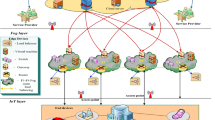Abstract
Internet of things (IoT)-based real-time applications, demanding energy-aware and low latency responses, are leading to a wider interest of researchers toward fog computing platforms to complement cloud computing by provisioning support for real-time computations near the end devices. However, the development of an optimized full-fledged fog platform, to meet latency, energy, and other quality of service (QoS) requirements of users and applications, is quite challenging. For real-time deadline-constrained tasks, energy efficiency and timeliness are two crucial parameters. Judicious scheduling of tasks can play a vital role in the effective utilization of such resource-constrained heterogeneous computing platforms. Greedy, semi-greedy, and random scheduling approaches are suggested by researchers to address energy efficiency and complexity-related issues. In this work, we employ dynamic voltage and frequency scaling (DVFS) technique on these three heuristics to ascertain its impact on reducing network energy consumption further without violating task deadline constraints. Simulations done on wide variety of task sets, on heterogeneous fog nodes, indicate that active energy consumption can be reduced with DVFS, with random heuristic exploiting the maximum benefit of DVFS followed by semi-greedy and greedy approach.
Access this chapter
Tax calculation will be finalised at checkout
Purchases are for personal use only
Similar content being viewed by others
References
Aslanpour MS, Gill SS, Toosi AN (2020) Performance evaluation metrics for cloud, fog and edge computing: A review, taxonomy, benchmarks and standards for future research. Internet of Things 12:100273. https://doi.org/10.1016/j.iot.2020.100273
Azizi S, Shojafar M, Abawajy J, Buyya R (2022) Deadline-aware and energy-efficient IoT task scheduling in fog computing systems: a semi-greedy approach. J Netw Comp Appl 201:103333
Bansal S, Bansal RK, Arora K (2020) Energy-cognizant scheduling for preference-oriented fixed- priority real-time tasks. J Syst Architect 108:101743
Bansal S, Bansal RK, Arora K (2021) Energy efficient backup overloading schemes for fault tolerant scheduling of real-time tasks. J Syst Architect 113:101901
Belmahdi R, Mechta D, Harous S (2021) A survey on various methods and algorithms of scheduling in fog computing. Ingénierie des Systèmes d’Information 26(2):211–224
Bonomi F, Milito R, Zhu J, Addepalli S (2012) Fog computing and its role in the internet of things. In: Proceedings of the First Edition of the MCC Workshop on Mobile Cloud Computing, pp 13. https://doi.org/10.1145/2342509.2342513 (2012).
Dabiri S, Azizi S, Abdollahpouri A (2022) Optimizing deadline violation time and energy consumption of IoT jobs in fog–cloud computing. Neural Comp Appl 34:21157–21173
Fizza K, Auluck N, Azim A (2022) Improving the schedulability of real-time tasks using fog computing. IEEE Trans Serv Comp 15(1):372–385
Fog computing and the internet of things: Extend the cloud to where the things are, cisco white paper (2015) http://www.cisco.com/c/dam/en_us/solutions/trends/iot/docs/computing-overview.pdf
Iorga M, Feldman L, Barton R, Martin MJ, Goren N, Mahmoudi C (2018) NIST: fog computing conceptual model, recommendations of the National Institute of Standards and Technology. NIST Special Publication 500-325. https://doi.org/10.6028/NIST.SP.500-325
Jamil B, Shojafar M, Ahmed I, Ullah A, Munir K, Ijaz H (2020) A job scheduling algorithm for delay and performance optimization in fog computing. Conc Comp: Pract Exp 32(7):e5581
Kaur N, Bansal S, Bansal RK (2015a) Task scheduling & energy conservation techniques for multiprocessor computing systems. Int J Netw Syst 2(2):5–8
Kaur N, Bansal S, Bansal RK (2015b) Towards energy efficient scheduling with DVFS for precedence constrained tasks on heterogeneous cluster system. In: 2nd IEEE International conference on Recent Advances in Engineering & Computational Sciences, pp 1–6
Kaur N, Bansal S, Bansal RK (2016) Energy efficient duplication-based scheduling for precedence constrained tasks on heterogeneous computing cluster. Multiagent Grid Syst, IOS Press 12(3):239–252
Kaur N, Bansal S, Bansal RK (2017) Duplication-controlled static energy-efficient scheduling on multiprocessor computing system. Concur Comp: Practice Exp 29(12):e4124
Kaur N, Bansal S, Bansal RK (2021) Survey on energy efficient scheduling techniques on cloud computing. Multiagent Grid Syst 17(4):351–366
Lee S, Lee SK, Lee S-S (2021) Deadline-aware task scheduling for IoT applications in collaborative edge computing. IEEE Wireless Comm Lett 10(10):2175–2179
Matrouk K, Alatoun K (2021) Scheduling algorithms in fog computing: a survey. Inter J Netw Distributed Comp 9(1):59–74. https://doi.org/10.2991/ijndc.k.210111.001
Naha RK, Garg S, Georgakopoulos D, Jayaraman PP, Gao LX, Xiang Y, Ranjan R (2018) Fog computing: Survey of trends, architectures, requirements, and research directions. IEEE Access 6:47980–48009. https://doi.org/10.1109/ACCESS.2018.2866491
Oma R, Nakamura S, Duolikun D, Enokido T, Takizawa M (2018) An energy-efficient model for fog computing in the Internet of Things (IoT). Internet of Things 1–2:14–26
Rao TVN, Khan MA, Maschendra M, Kumar MK (2015) A paradigm shift from cloud to Fog computing. Inter J Comp Sci Eng Tech 5(11):385–389
Rizvandi NB, Taheri J, Zomaya AY (2011) Some observations on optimal frequency selection in DVFS-based energy consumption minimization. J Parallel Distrib Comp 71(8):1154–1164. https://doi.org/10.1016/j.jpdc.2011.01.004
Stankovic JA, Spuri M, Ramamritham K, Buttazzo GC (2012) Deadline scheduling for real-time systems: EDF and related algorithms, vol 460. Springer Science & Business Media
Xu J, Sun X, Zhang R, Liang H, Duan Q (2020) Fog-cloud task scheduling of energy consumption optimisation with deadline consideration. Inter J Internet Manufact Serv 7(4):375–392
Author information
Authors and Affiliations
Corresponding author
Editor information
Editors and Affiliations
Rights and permissions
Copyright information
© 2024 The Author(s), under exclusive license to Springer Nature Singapore Pte Ltd.
About this paper
Cite this paper
Bansal, S., Bansal, R.K., Sehgal, N. (2024). Analysis of Greedy, Semi-greedy, and Random Scheduling Heuristics with DVFS for Heterogeneous Fog Computing Platform. In: Mehta, G., Wickramasinghe, N., Kakkar, D. (eds) Innovations in VLSI, Signal Processing and Computational Technologies. WREC 2023. Lecture Notes in Electrical Engineering, vol 1095. Springer, Singapore. https://doi.org/10.1007/978-981-99-7077-3_41
Download citation
DOI: https://doi.org/10.1007/978-981-99-7077-3_41
Published:
Publisher Name: Springer, Singapore
Print ISBN: 978-981-99-7076-6
Online ISBN: 978-981-99-7077-3
eBook Packages: EngineeringEngineering (R0)




